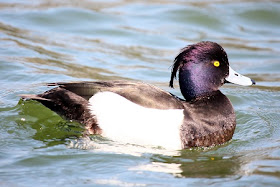I visited Waikiki HI, USA to see biological impacts of Fukushima No.1 nuclear power plant accident. Though I have visited various places in Japan to see the health consequences of the accident, I have never found any effect against creatures in Japan. However, there is a little concern that radioactive materials will be brought to overseas by the wind or ocean current. So I have wanted to see the effects against overseas too and I visited HI, USA.
Located on the south shore of Honolulu, the world-famous neighborhood of Waikiki was once a playground for Hawaiian royalty. Known in Hawaiian as "spouting waters," Waikiki was introduced to the world when its first hotel, the Moana Surfrider, was built on its shores in 1901. Today, Waikiki is Oahu’s main hotel and resort area and a vibrant gathering place for visitors from around the world. Though Waikiki is not so famous for bird watching place, we can see variety of birds flying there and we can enjoy bird watching too.
Generally speaking, animal's growths are so fast than human beings that they are more sensitive to radioactive materials of the environment than us. So I visited Waikiki to see effects of the accident against creatures which are grown up by Hawaiian food and water. Fortunately, I could see them grown up safely and I couldn't find any impact of the Fukushima nuclear power plant accident. It seems that there is no problem for childbirth and child-rearing in Hawaii, USA.
Posted by Yoshitaka Kiriake from Japan on April 25, 2014.
米国ハワイ州のワイキキは世界有数の都市化された観光地である。しかも豊かな自然が保護されており人間と多種多様な野生動物たちとが共存している都市である。野鳥の種類は驚くほど豊富で、海にはクジラやウミガメもいた。
Red-crested cardinal

Waikiki beach
Diamond Head
Waikiki beach
House finch
Dove
Spotted dove
Zebra dove
Japanese white-eye
Jawa sparrow
House sparrow
House sparrow
Cattle egret
Red junglefowl
Common myna
Mallard
Duck
Yellow-fronted canary
Common waxbill
Pacific golden-plover
Red-vented bulbul
Black-crowned night-heron
Common peafowl
Lizard
Maui Island
I could see Chameleon at Maui Island.
It is my first time to touch it.
Look! Skin color has changed!
Hawaiian foods are good and safe.
No one have any worry about foods.
This is my breakfast at traveling.
Fruits are cheaper and healthy.
About 3 years have passed since Fukushima Daiichi nuclear power plant accident. I have visited various places of Japan to see the health consequence of the accident.
Fortunately I have never found any impacts by the accident among Japanese creatures. As far as I know, nobody has health problem which is caused by the accident in Japan.
Our Prime Minister Abe assures that "The situation is under control. The influence of the contaminated water is completely blocked within Fukushima. There are no health-related problems until now and there will never be health problems." He also said that "Tokyo is 250 kilometers away from Fukushima, and the kind of danger that you imagine does not exist in Tokyo. Tokyo is a very safe city."
As PM Abe said, Hawaii is very far away from Fukushima too, people in Hawaii have no concern about the nuclear power plant accident. Hawaiian people have already forgotten the accident, because they think radioactive materials cannot reach there.
We know there is no problem for child birth and child rearing in Hawaii, USA. So Hawaiian people are living without any concern about the accident. I continue to visit various places in the world to see the effects of the accident, because I can meet various creatures which are more sensitive to radioactive materials from the environment. It is important to see their health for our safety.







































































